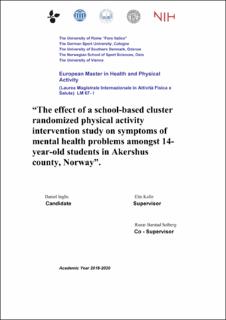The effect of a school-based cluster randomized physical activity intervention study on symptoms of mental health problems amongst 14- year-old students in Akershus county, Norway
Master thesis
Published version
Permanent lenke
https://hdl.handle.net/11250/2728073Utgivelsesdato
2020Metadata
Vis full innførselSamlinger
Sammendrag
Introduction: The prevalence of mental health problems has shown to increase amongst adolescents. Common interventions are often stigmatized, limiting the likelihood of adolescents seeking help for mental health related problems. Alternatively, physical activity (PA) has been hypothesized to have a positive effect on mental health. However, its evidence-based practice has proven to be scarce. This thesis evaluated the effect of a 9-month long school-based PA intervention on total mental health problems among Norwegian adolescents. Further, evaluating intervention effect differences in respect to adolescent’s mental health problems at baseline.
Methods: Eleven secondary schools (N = 886 students, 14 y) was cluster-randomized into three groups; Intervention model M1 (n=3), intervention model M2 (n=4) and control (n=4), with the intervention models implementing additional 120 min of PA, each week. General mental health problems were assessed by a strength and difficulties questionnaire (SDQ). A linear mixed model was used to evaluate the intervention effect on SDQ scores, and differences between the effect in relation to the degree of SDQ scores at baseline.
Results: No significant intervention effect was seen in total SDQ scores. Nor did the effect vary significantly in relation to the degree of SDQ scores at baseline, concerning both interventions and genders, compared to control. A positive effect was seen in the subcategory of “prosocial behaviors” and “relationship with peer problems” amongst boys in the M1 intervention (P = 0.024 and P = 0.045), and a negative effect on “relationship with peer problems” amongst girls in the M2 intervention (P = 0.012).
Conclusion: The two interventions did not provide any significant effect on total mental health problems. However, implementing one additional PE class, alongside 30 min of free activities, and PA-based learning (M1), may enhance social relationships amongst boys. Conversely, additional PA through freely chosen activities, little structure and supervision by teachers (M2) may negatively affect peer relationships amongst girls.
Beskrivelse
Masteroppgave - Norges idrettshøgskole, 2020
